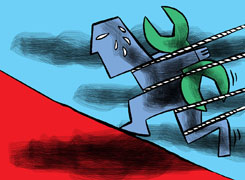Chandu Nair | Answer |Ask -Follow
VC, Angel Investing, Entrepreneurship Expert - Answered on Nov 27, 2023
He has direct experience in angel, venture capital and strategic investor funding. Over the last three decades, he has made a name for himself in industry, consultancy, media and information services.
Nair is on the advisory boards of the Chennai-based private equity firm Fulcrum and the social impact fund, Menterra. He's an independent director on the board of India's first retail building products company, Shankara Building Products Limited.
He was the co-founder of Scope e-Knowledge Center, a pioneering knowledge process outsourcing company, as well as the co-founder of a business-to-business e-commerce venture, both of which he successfully exited.... more

Hello, sir. I founded a home decor brand 2 years ago and we are just starting to gain traction in the market. We sell across multiple channels - B2B, B2C and D2C as well. But as a Founder, one of my weaknesses is the lack of selling skills. Should I focus on building a Business Development team in order to generate consistent sales? Also, how do I get better at selling?
Each of these channels- B2B B2C D2C - require different kinds of skills. The customer segments too could be different, perhaps the products/ SKUs too. It is my belief that the founder himself should be a salesperson esp in the initial days(years!). The first key thing is to understand the buyer's key problems and how your product is better at solving it than others in the market including alternatives. While doing this, it is important to understand who exactly is your buyer- in B2B, the buyer may be a hotel or restaurant or an office etc. Which sort of B2B segment are you targeting, how are they currently buying, from who, why, what terms do they purchase, how long is the sales cycle time, typical order value, purchase frequency etc? When it comes to B2C, the game is quite different. Are you selling both offline and online? The methods can change.
It would be useful for you to get a co-founder who has deep sales and marketing experience in this sector or B2C online/ offline. Alternatively, get a consultant who can advise you on the phase wise approach to follow, what metrics to use to track effectiveness, the kind of spend required, and so on.
Pl also reach out to others in the D2C community and understand what is working/ not working for them, the kind of structure they have, the outsourced agencies they use.
It is a process of learning. It would be good for you to get a grasp of it; simultaneously, in order to save on time, energy and money, pl consider a co-founder and /or a suitable consultant to guide you through the process. The appropriate hires can be made as required.
Chandu Nair | Answer |Ask -Follow
VC, Angel Investing, Entrepreneurship Expert - Answered on Nov 27, 2023
He has direct experience in angel, venture capital and strategic investor funding. Over the last three decades, he has made a name for himself in industry, consultancy, media and information services.
Nair is on the advisory boards of the Chennai-based private equity firm Fulcrum and the social impact fund, Menterra. He's an independent director on the board of India's first retail building products company, Shankara Building Products Limited.
He was the co-founder of Scope e-Knowledge Center, a pioneering knowledge process outsourcing company, as well as the co-founder of a business-to-business e-commerce venture, both of which he successfully exited.... more

Hello, sir. I founded a home decor brand 2 years ago and we are just starting to gain traction in the market. We sell across multiple channels - B2B, B2C and D2C as well. But as a Founder, one of my weaknesses is the lack of selling skills. Should I focus on building a Business Development team in order to generate consistent sales? Also, how do I get better at selling?
Each of these channels- B2B B2C D2C - require different kinds of skills. The customer segments too could be different, perhaps the products/ SKUs too. It is my belief that the founder himself should be a salesperson esp in the initial days(years!). The first key thing is to understand the buyer's key problems and how your product is better at solving it than others in the market including alternatives. While doing this, it is important to understand who exactly is your buyer- in B2B, the buyer may be a hotel or restaurant or an office etc. Which sort of B2B segment are you targeting, how are they currently buying, from who, why, what terms do they purchase, how long is the sales cycle time, typical order value, purchase frequency etc? When it comes to B2C, the game is quite different. Are you selling both offline and online? The methods can change.
It would be useful for you to get a co-founder who has deep sales and marketing experience in this sector or B2C online/ offline. Alternatively, get a consultant who can advise you on the phase wise approach to follow, what metrics to use to track effectiveness, the kind of spend required, and so on.
Pl also reach out to others in the D2C community and understand what is working/ not working for them, the kind of structure they have, the outsourced agencies they use.
It is a process of learning. It would be good for you to get a grasp of it; simultaneously, in order to save on time, energy and money, pl consider a co-founder and /or a suitable consultant to guide you through the process. The appropriate hires can be made as required.
You may like to see similar questions and answers below
Amit Grover | Answer |Ask -Follow
Answered on Feb 08, 2012
Harsh Bharwani | Answer |Ask -Follow
Entrepreneurship Expert - Answered on Oct 19, 2023
Chandu Nair | Answer |Ask -Follow
VC, Angel Investing, Entrepreneurship Expert - Answered on Oct 19, 2023
Maxim Emmanuel | Answer |Ask -Follow
Soft Skills Trainer - Answered on Mar 26, 2024
Krishna Kumar | Answer |Ask -Follow
Workplace Expert - Answered on Feb 16, 2024
Ramalingam Kalirajan |10906 Answers |Ask -Follow
Mutual Funds, Financial Planning Expert - Answered on Dec 19, 2025
Nayagam P P |10859 Answers |Ask -Follow
Career Counsellor - Answered on Dec 19, 2025
Ramalingam Kalirajan |10906 Answers |Ask -Follow
Mutual Funds, Financial Planning Expert - Answered on Dec 19, 2025
Ramalingam Kalirajan |10906 Answers |Ask -Follow
Mutual Funds, Financial Planning Expert - Answered on Dec 19, 2025
Ramalingam Kalirajan |10906 Answers |Ask -Follow
Mutual Funds, Financial Planning Expert - Answered on Dec 19, 2025
Radheshyam Zanwar |6751 Answers |Ask -Follow
MHT-CET, IIT-JEE, NEET-UG Expert - Answered on Dec 19, 2025
Radheshyam Zanwar |6751 Answers |Ask -Follow
MHT-CET, IIT-JEE, NEET-UG Expert - Answered on Dec 19, 2025
Samraat Jadhav |2514 Answers |Ask -Follow
Stock Market Expert - Answered on Dec 18, 2025
Reetika Sharma |432 Answers |Ask -Follow
Financial Planner, MF and Insurance Expert - Answered on Dec 18, 2025
Reetika Sharma |432 Answers |Ask -Follow
Financial Planner, MF and Insurance Expert - Answered on Dec 18, 2025



























